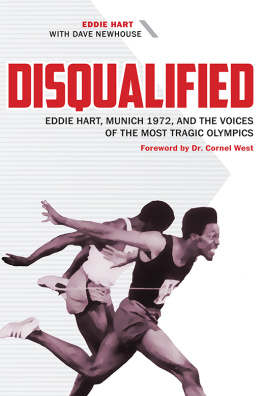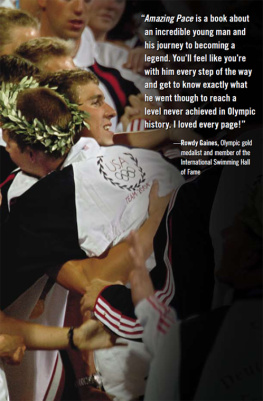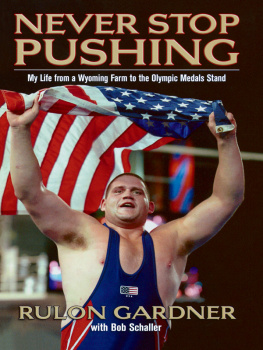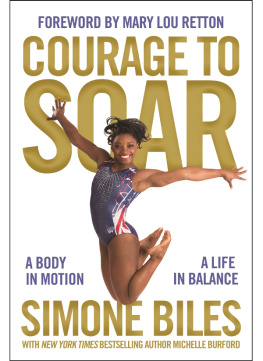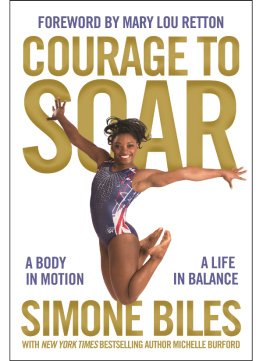
Tom Daley is the most decorated British diver of all time. At the age of thirteen, Tom won gold at the European Championships and has gone on to become a four-time Commonwealth Games champion, a double FINA World champion, and an Olympic bronze and gold medalist. A three-time BBC Young Sports Personality of the Year winner and an advocate for LGBTQ+ rights across the world, Tom currently lives in London with his husband and son.
Twitter: @TomDaley1994
Instragram: @TomDaley
Facebook.com/TomDaleyOfficial
Also by Tom Daley
My Story
Toms Daily Plan
Toms Daily Goals
Tom Daley
Coming Up for Air

For Robbie and Lance,
whose love made me fly higher
than I ever thought possible.
Contents
INTRODUCTION
As I walked to the end of the ten-metre board, I glanced down. The distinctive pattern of the interlocking rings and the words London 2012 shone through the bright blue of the water. Olympic banners were plastered across every available wall, along with flags of the participating countries, and my own face grinned back at me on various enormous screens sitting high above the stands. The atmosphere was electric; it was a cacophony of noise from the PA system, as well as cheers, shouts and applause from the crowd. The sound ricocheted around the domed, undulating ceiling of the London Aquatics Centre. It was almost deafening.
I inhaled slowly and steadily. The air was thick with the sticky warmth of chlorine and the charged crowd. I needed to focus hard. My heart pounded to the tips of my fingers.
It takes 1.6 seconds between leaving the board and hitting the water. The importance of the approaching 1.6 seconds was not lost on me.
This was it: the Olympic final and the moment I had dreamed of, and worked for, my whole life.
The whistle blew and an eerie silence settled. All I could hear was the gentle and rhythmic gurgle and swoosh of water as it flowed in the drains.
I adored the buzz of the home crowd. There were 18,000 people at the pool and the main BBC channels had tuned in to the diving. I knew I carried the hopes of many on my shoulders and that millions of pairs of eyes would be on me from sofas, kitchens and gardens, along with the focus of the seven judges who would mark the execution of my dives, but the pressure felt like a positive thing. It felt like an almighty fizz and rush of adrenalin. For most athletes, competing at an Olympic Games is a once-in-a-lifetime opportunity. To compete in front of a home crowd at an Olympic Games is something very few people ever get to experience. I knew I was very fortunate. I needed to just enjoy myself and, in the words of my dad, Dive my socks off.
I was about to launch into my first dive of sixthe Twister. This dive consists of a sequence of moves as my body snaps into different positions in the air like elastic: I jump into the air, then move into a twisting position to complete two and a half twists; at the same time I am somersaulting two and a half times. I finish the last somersault in a pike positionknees straight and body bent at the waistbefore ripping into the water, like a bullet.
Before the Olympic Games, this was my safest dive and one I knew I could perform well. It was one of my harder dives but executed correctly, the rewards were high. In each individual diving competition, there are six dives: a forward dive, facing forwards when we take off; a backward dive, taking off with our backs to the water; reverse dives where we face the water, take off forwards and rotate backwards towards the board; an inward dive, where we face the back of the board, jump backwards and rotate forwards towards the board; a handstand dive; and a twisting dive. The Twister is the twisting dive that every elite diver performs. This was the one dive that I always knew I could confidently score over 90 points. The Twister always opened my set and was the one dive that I used to kick off each competition because I knew it could propel me towards the top of the leader board.
A good place to be.
But in the run-up to the Games, small things had started to go wrong. There were times that I had leant a little bit too far back and landed awkwardly on my side or shoulder, or when I got lost in the dive and would be flailing through the air without knowing which way was up and which way was down. One day, I landed gracelessly on my back with an almighty smack and on another, I wrenched my neck. My confidence had been slowly chipped away. The possibilities of what could go wrong lurked like shadows in the back of my mind.
I had made it through the prelims and the semis of the individual event, and the numbers had been whittled down from thirty-two divers to eighteen and then to twelve. The reigning Olympic champion, Matthew Mitcham, had finished in an agonising thirteenth place in the semis. It can happenone bad dive of six and you were outbut I was still in the game. My prelim was one of my worst performances in competitions for a long time and I had finished fifteenth out of eighteen places. As the pressure mounted there had been an uplift in the numbers across the board, as each of the competitors bettered our last performance and the scores crept up. But regardless of the numbers, those earlier competitions were over with, and at that moment they were no longer important. It was always just about making it to the finals. Each dive was a completely independent event. I knew at the end of those six dives, I would either be an Olympic medallist or not.
I took off, rolling into a twist, twisting two and a half times with one arm across my body and the other to my head, before rolling into a sharp and precise pike position to somersault two and a half times forwards. In my dives, I have to be hyper-vigilant and spot the waterI need to see everything in order to count the rotations, so I know where my body is in the air. Im not just spinning in one direction; there are a lot of movements going on at once and I need to keep every part of my body in the right place at the right millisecond, like an innate internal compass. There is not an opportunity to think about anything else but precisely what I am doing in that instant. At that moment, my focus has to be razor-sharp; there is no space to blink or even breathe. The world whizzes by in a somewhat organised blur. I often see other things as I rotate or twistfaces, flashes of wall, postersbut I can always spot the water, and I need to; it is the one constant in every diving pool.
As I spun and tried to spot the pool, I was blinded by a sudden and disarming white flash of cameras. The flashes sliced across my vision. I blinked, and there is no time to blink in that 1.6 seconds. I was confused and my brain felt dislocated from my body. I landed slightly short, not really knowing what had happened. As I entered the water I was not vertical; it felt a bit messy and I knew that it wasnt great.
As I climbed out of the water, I gestured to my coach, Andy Banks, and he could see what had happened. I felt a wave of anger and injustice roll over me. I had worked so hard for that moment and someone had inadvertently ruined my chances. The spectators at any diving competition are always told not to use flash photography. On that day, maybe they didnt realise the importance of this instruction, perhaps they did not realise their flashes were clicked on, or possibly some peoples cameras had gone off automatically. It was impossible to know why. The scores came up on the board. It was unanimous 7s and an overall score of 75.60certainly not enough to give me a chance at one of the top medals.
Next page



